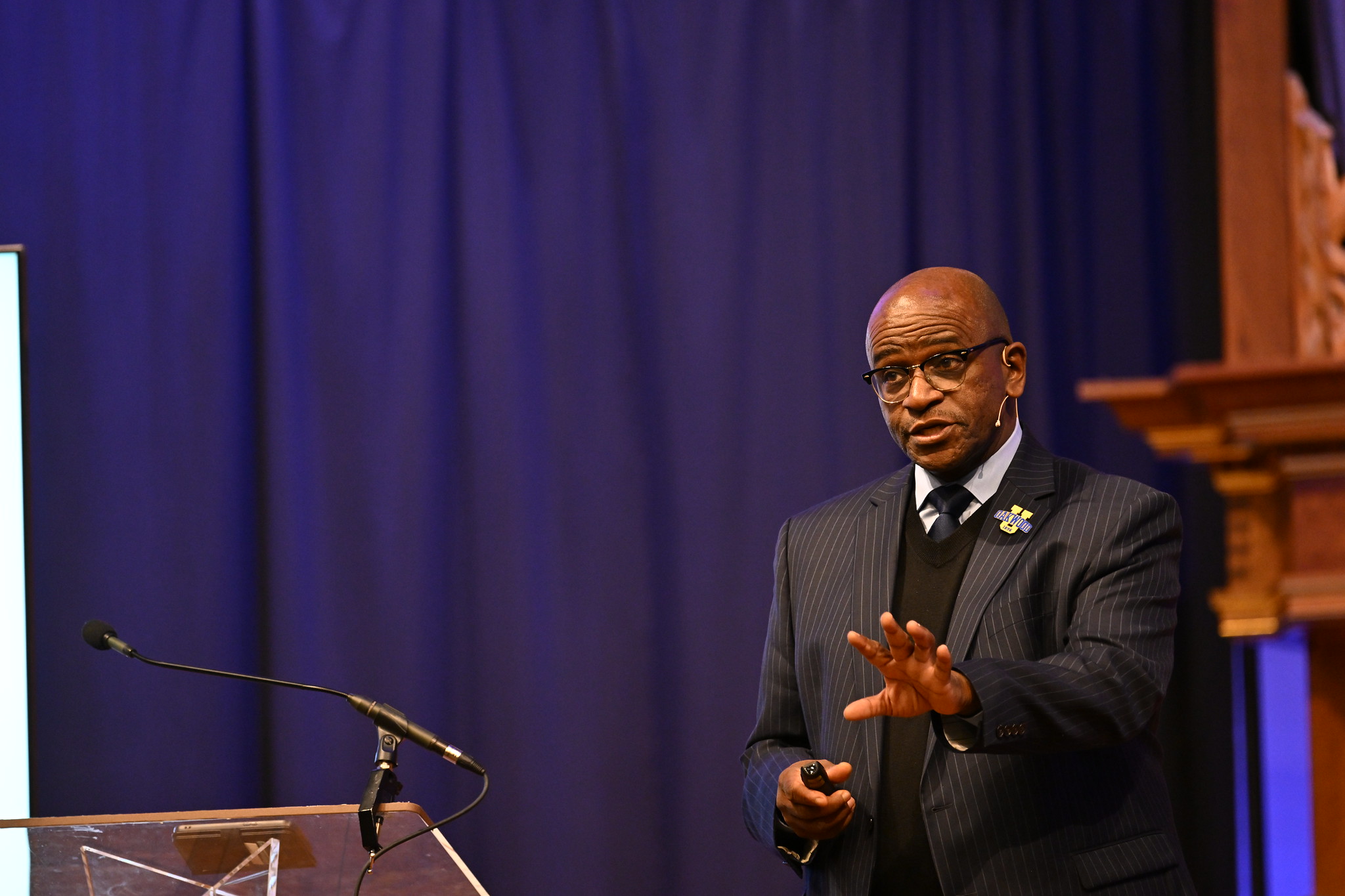
At the NAD PARL conference "Reconstructing Religious Liberty in a Time of Religious and Secular Extremes," on October 21, 2023, Oakwood University president Leslie Pollard offers a “teaching moment” to the audience. Photo by Ronald Pollard
Academics, theologians, religious freedom experts, students, and church members gathered on the campus of Southern Adventist University on October 20-21, 2023, for a North American Division (NAD) conference “Reconstructing Religious Liberty in a Time of Religious and Secular Extremes.” The two-day event, organized by the NAD Public Affairs and Religious Liberty (PARL) ministry team, featured five keynote speakers: David French, Samuel Perry, Tobias Cremer, Leslie Pollard, and Ivor Myers.
The conference focused on the current state of religious liberty and its place in Bible prophecy, and explored ways to address increasing political divisions in our nation and our churches. Speakers covered topics including political and religious extremism, keeping the Kingdom of Heaven central, and avoiding the distracting lure of derisive politics. Panel discussions highlighted the role of social media in identity politics and practical steps for transcending the partisan divide.
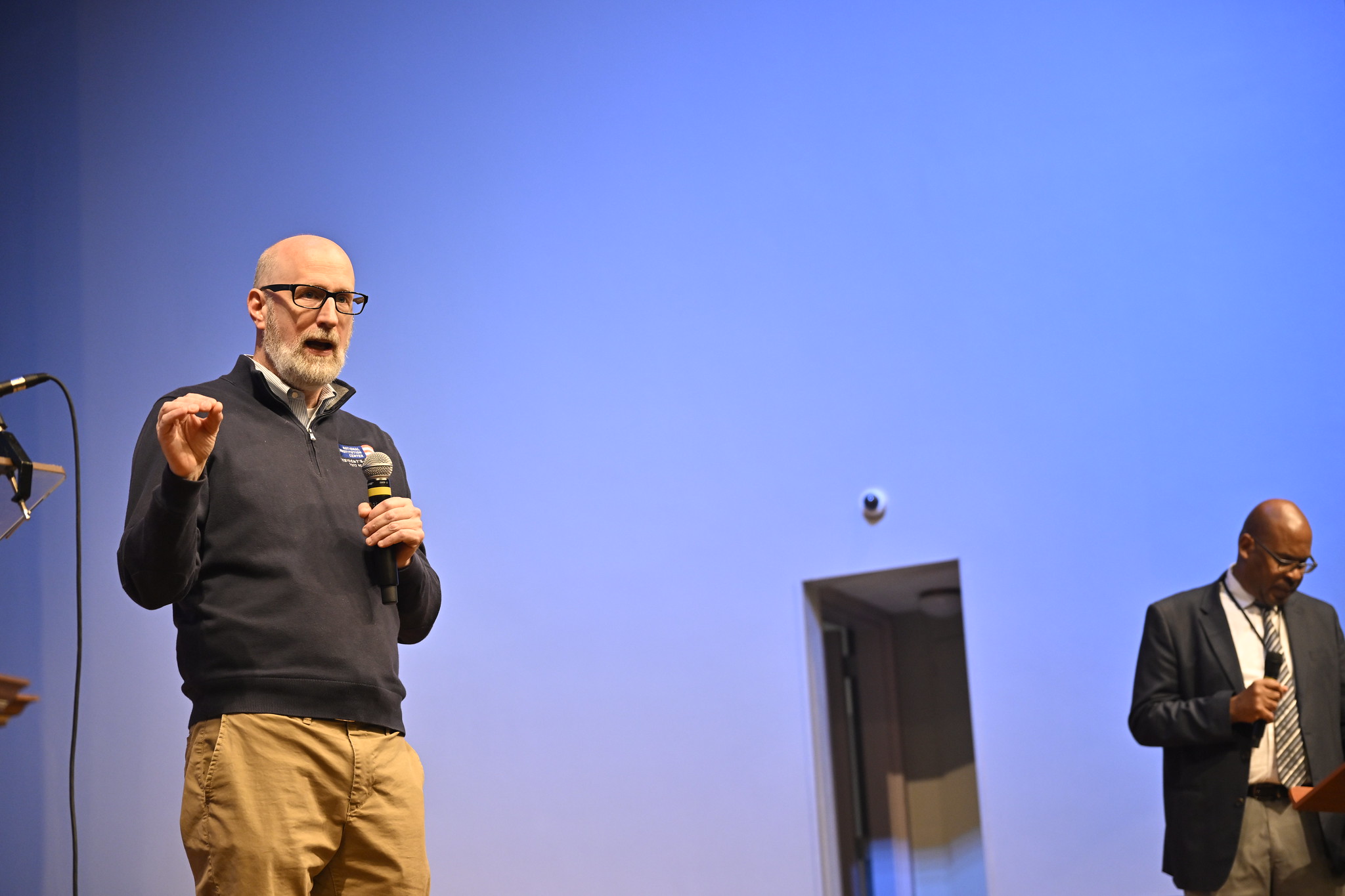
Main speaker David French speaks on religious liberty and finding truth in a confusing political landscape on October 20, 2023, at the PARL "Reconstructing Religious Liberty" conference. Photo by Ronald Pollard
“Recognizing our nation’s current climate of partisan politics and societal schisms, our goal for the conference was to emphasize how we as Christians are called to reject this spirit of hostility and continue to live and serve as ambassadors for Christ,” explained Melissa Reid, NAD PARL associate director.
The conference opened with a welcome from Orlan Johnson, NAD PARL director, who asked the audience, “Is your faith forming your politics, or are your politics forming your faith?” He went on to emphasize the importance of civility in political dialogue and of keeping hope in Jesus at the forefront of discussion. Our primary goal, Johnson said, should be to find ways to speak respectfully about differences of opinion.
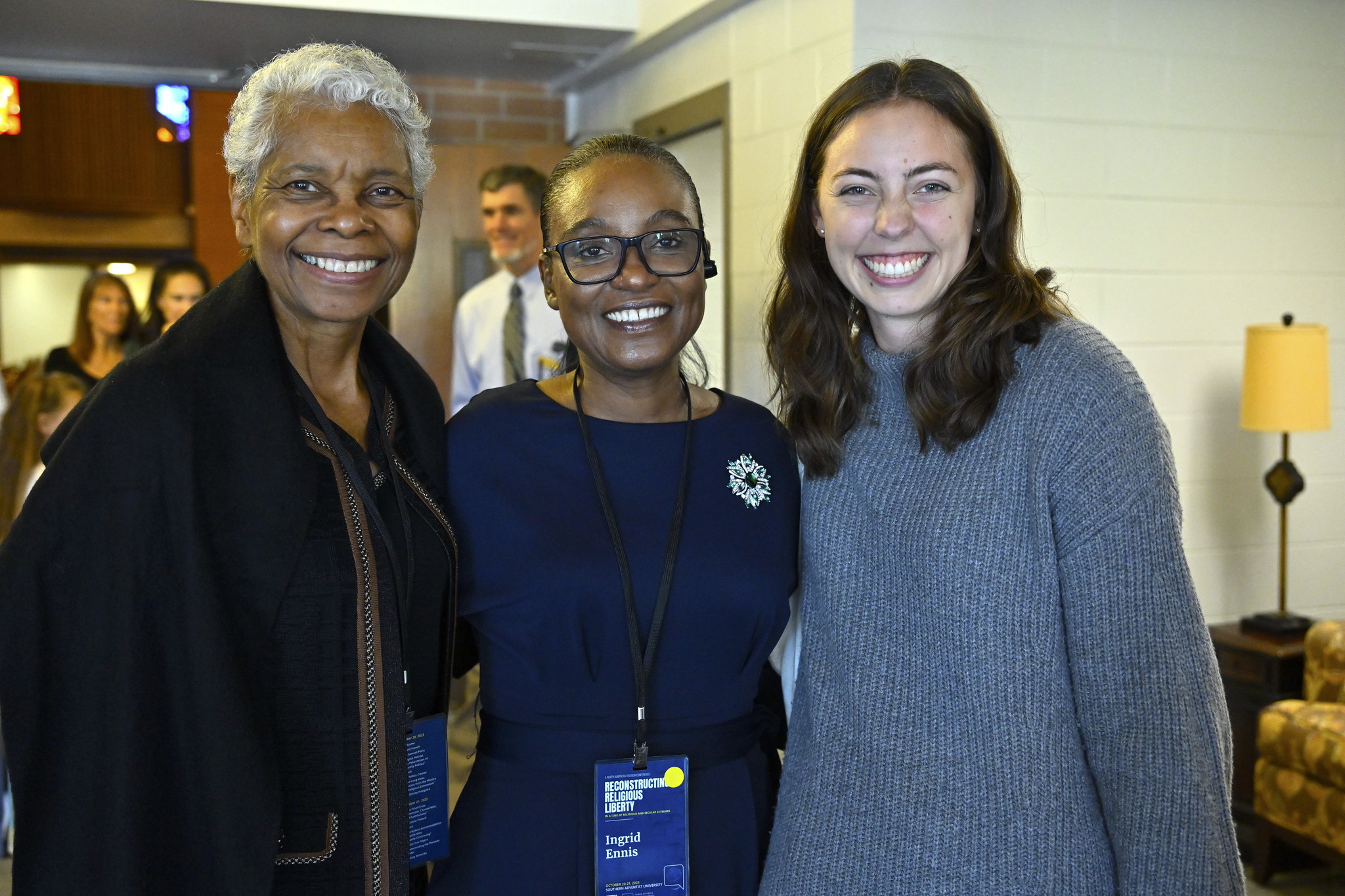
Reconstructing Religious Liberty conference attendees smile brightly at the conference's Sabbath session on October 21, 2023. Photo by Ronald Pollard
Pursuing Justice
The Friday session began with attorney and New York Times columnist, David French. French, who has worked on high profile religious liberty litigation, spoke of the advances religious liberty has recently achieved. At this point in history, Americans have more religious freedom than any other time, French began. So why don’t we feel that way? French described how the current “vicious culture war” is undermining basic Christian principles such as those found in Micah 6:8.
“One of the things that liberty does is it actually allows us to enact that exact moral framework,” he said. “Freedom gives us the ability to pursue justice. When we pursue justice in an atmosphere of liberty, we’re going to interact with our fellow human beings to whom we owe an obligation of kindness. And then when we hear their perspective, when it differs from our own, it should induce humility.”
During the question-and-answer session, French addressed questions from the audience, such as: How can we find truth in a time where misinformation is rampant? His answer was to broaden our media diet and seek the best voices from both sides before forming an opinion.
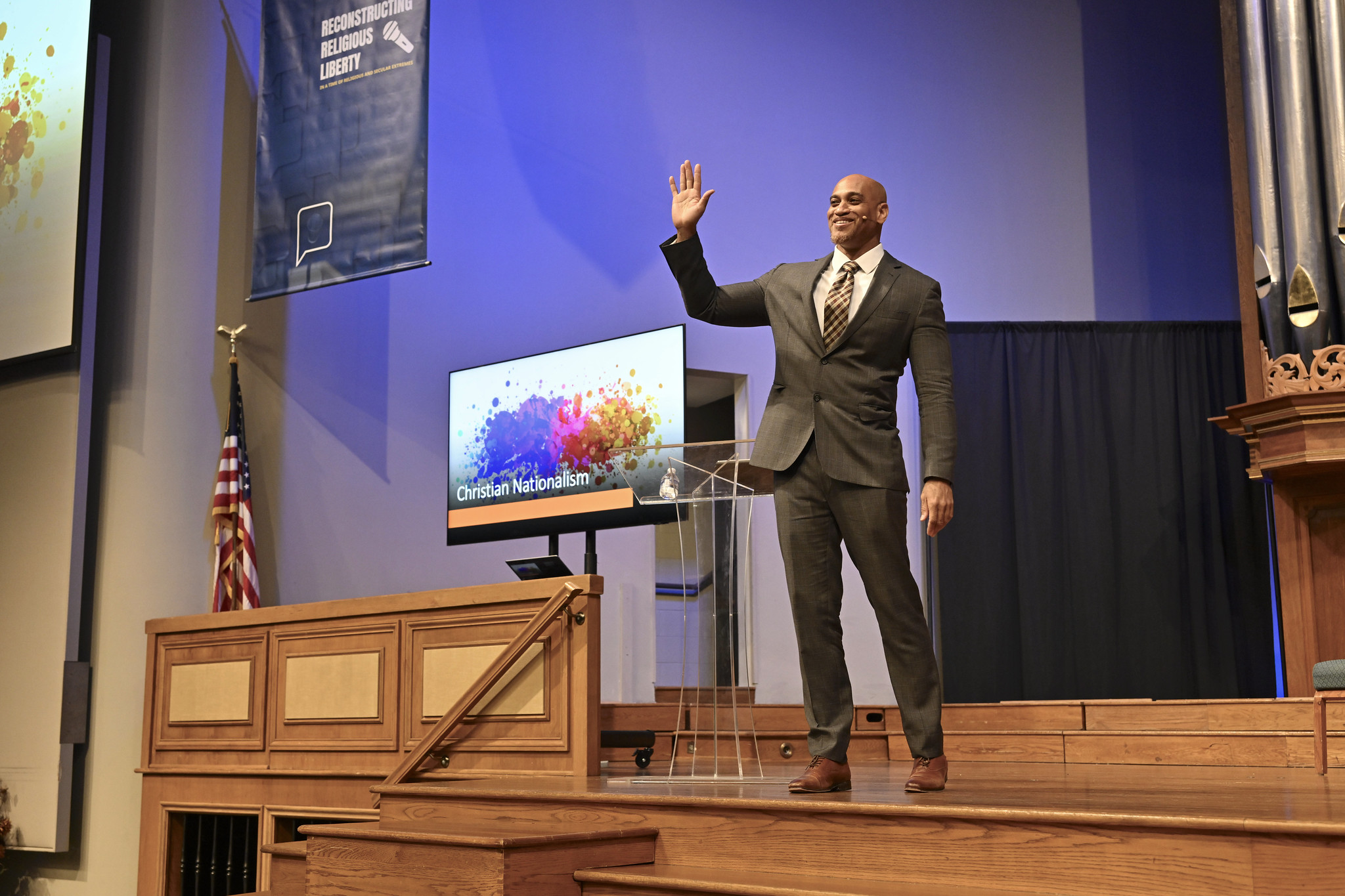
Ivor Myers delivers his message on Christian nationalism and Bible prophecy on October 21, 2023, at the PARL conference. Photo by Ronald Pollard
Christian Nationalism: A Dangerous Path
Samuel Perry, professor of sociology at the University of Oklahoma, presented his research on Christian nationalism. Perry, an author and award-winning scholar, defined Christian nationalism as “the belief that the American republic is defined by Christianity — and that the government should take active steps to keep it that way.”
Christian nationalism amplifies polarization and division, leading to an “us versus them” mentality, Perry said. Human beings’ natural inclination of finding groups of like-minded individuals and staying within the confines of that group is a major cause for the current polarization Americans face. He warned against assuming we know exactly what people believe based on labels such as conservative, liberal, or moderate conservative. Perry acknowledged that encouraging open discussions and listening to people who believe differently is essential to healing the divide between political parties, as well as exercising moderation in the language we use, not moderation in values we believe in.
In his research, Perry contrasted Christian nationalism and prophetic Adventism, showing similarities in origin and source documents like the Constitution, but differing drastically in character and destiny. Christian nationalists are fighting to return America back to its idealistic Christian roots, while Adventists believe that America will “eventually repudiate its republican and protestant principles.”
On Friday afternoon, Tobias Cremer, a fellow at Cambridge College, presented his research on Christian nationalism in America and Western Europe. Cremer, who holds multiple master’s degrees and a doctorate, splits his time between Berlin, Germany, and Oxford University. In his research, he explores the relationship between Christianity and right-wing politics.
To open his presentation, Cremer took the audience on an imaginary walk through Paris, Berlin, and Washington, D.C. In each of these cities, citizens assembled with Christian symbols, and blasted Christian music. Their purpose was not religious; these were right-wing political rallies. Cremer explained that the very concept of religion has become secularized.
“What we are seeing at the moment is, to some extent, the erosion of traditional sources of identity in Western societies,” Cremer said. “We are seeing trends such as secularization, individualization, and erosion of class identity. Basically, an erosion of traditional identities that have fueled these traditional divides, and instead are forming a crisis of identity in parts of the population.”
“In a time of cultural unrest and division, what are schools doing to promote open discussions and compassionate listening?” was the central question posed by Council for Christian Colleges and Universities president, Shirley Hoogstra. The role of Christian education, Hoogstra said, is to counteract polarization. “Let’s lower the polarization scale and move higher on the fruit of Spirit scale,” she said.
In her presentation, Hoogstra shared six programs that are being implemented in Christian colleges that encourage proximity to people who believe and think differently.
“Christian colleges are the antidote to the decay we see in society,” Hoogstra concluded.
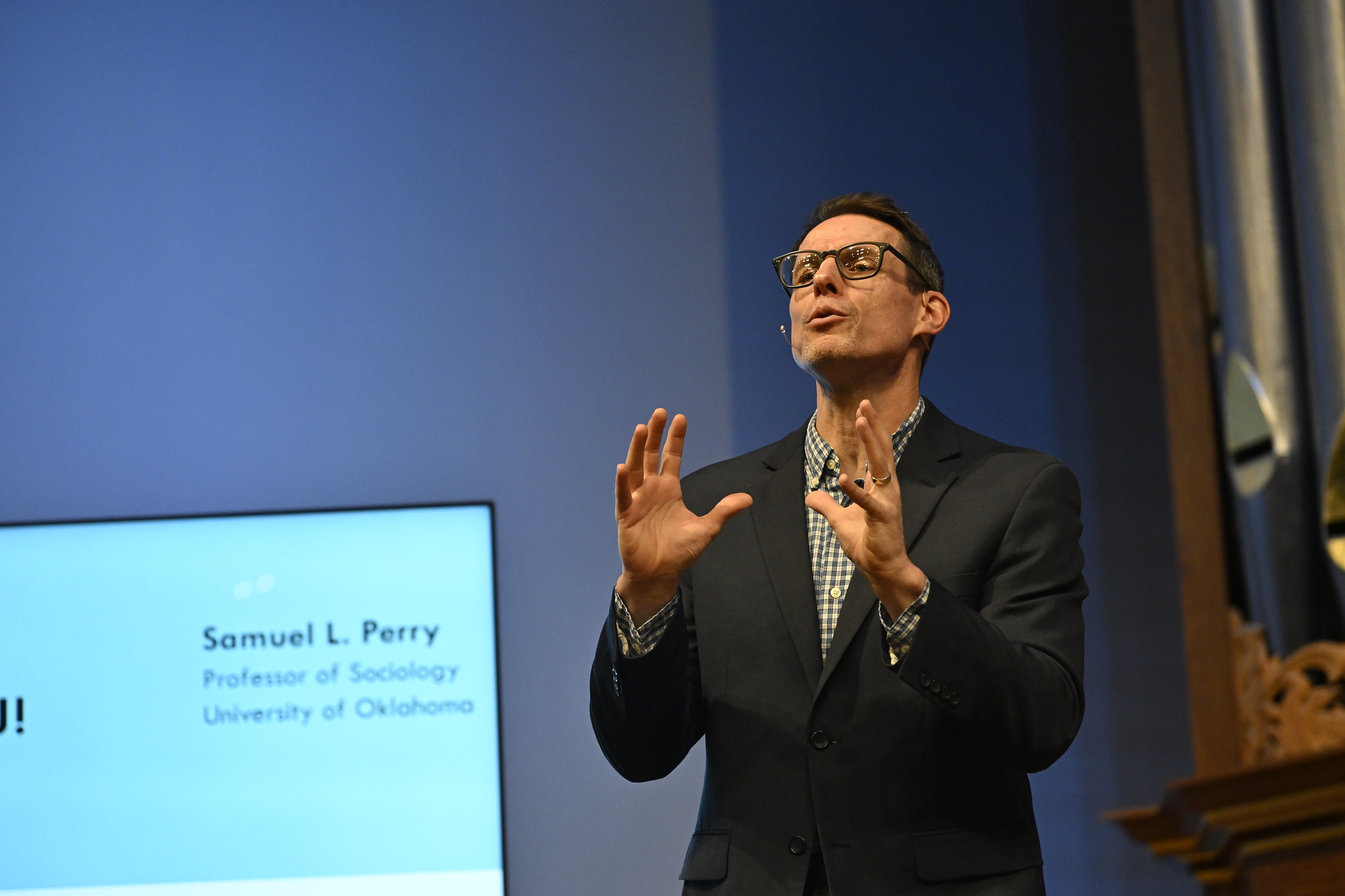
Samuel Perry, professor of sociology at the University of Oklahoma, presents his research on Christian nationalism on October 20, 2023. Photo by Ronald Pollard
Prophecy and Religious Freedom
The Sabbath morning worship service at Collegedale Church of Seventh-day Adventists featured Leslie Pollard, author, minister, and president of Oakwood University. Pollard addressed pertinent issues regarding religious liberty and how we, as Christians, can navigate divisive politics.
“Let’s not get sucked into the whole political warfare that characterizes and polarizes our country,” Pollard admonished. “We have our own agenda, and it’s a Kingdom agenda.”
“You [have] two views here, and two choices. There’s Christian nationalism, which conflates a flag with the cross and makes them virtually synonymous. And you’ve got the other view … which separates those things, which allows a respectable patriotism — meaning that we should be committed to not only helping the country … [but also] calling it back to accountability.”
Pollard concluded with two choices: Romanticize the Republic and work to recreate it in our Christian image and threaten our liberties; or remind the Republic of its constitutional confession and work to guarantee civil and religious liberty for the most vulnerable populations. We are not called to be neutral, Pollard said. We are called to stand on one side of the controversy.
The second keynote speaker on Sabbath was Ivor Myers, lead pastor of Living Manna Online Church, director of Power of the Lamb ministries, and co-host of 3ABN’s “Battles of Faith” series. Myers focused on Revelation 20 and America in Bible prophecy. Adventists, Myers said, are increasingly protective of the second beast of Revelation, recognized by Adventists as the United States of America.
“There’s nothing wrong with loving your country. But when you put love of country, this country, above love of that country, now we have a problem,” Myers said. “God says listen, I want you to be citizens of the kingdom of heaven.”
Johnson, summed up the event this way: “We are so pleased with all the support that we received at Southern Adventist University with our conference. It was a tremendous success. Helping our members to understand the difference between focusing on life, liberty and the pursuit of happiness and spending more time committed to the Christian imperative of love, faith, and the pursuit of holiness. Sometimes we must be reminded that this place is not our home, and the goal is to spend all eternity with Jesus in glory!”
— Alana Crosby is a senior at Southern Adventist University.
